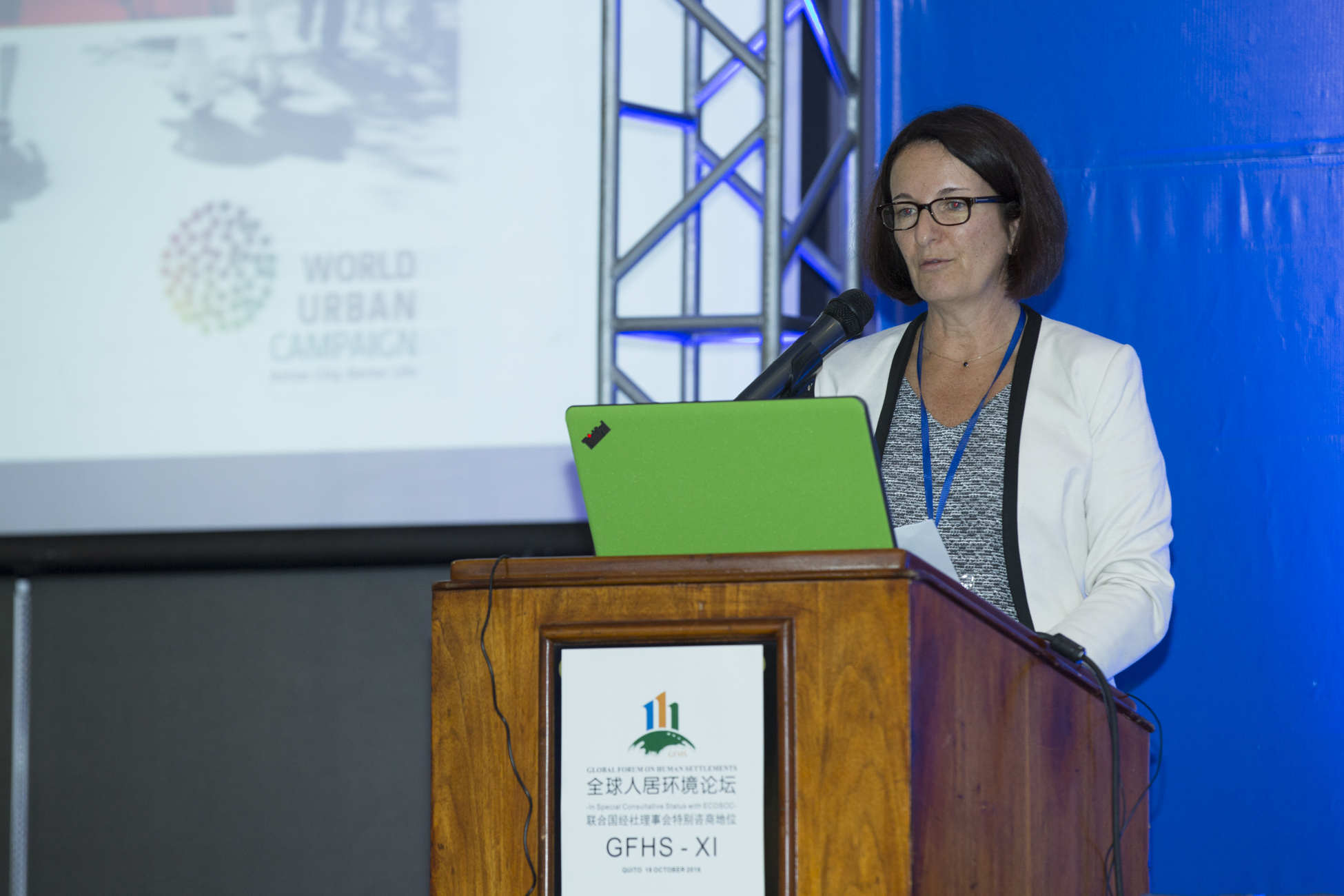


Committed to Sustainable Cities and Human Settlements for All

In Special Consultative Status with ECOSOC
Search
NameDescriptionContent
Home>>Text
Christine Auclair:Urban Solutions towards the City we need and the New Urban Agenda
Source:
|
Author:gfhsforum
|
Published time: 2017-01-10
|
809 Views
|
Share:

Christine Auclair, Project Leader, World Urban Campaign, UN-Habitat
I would like to thank the Global Forum on Human Settlement for organizing this important event in parallel to the Habitat II Conference focusing on compact and sustainable cities.
The World Urban Campaign is one of the largest global advocacy platforms for cities, lead by UN-Habitat, and driven by 170 organizations around the world committed to bringing cities at the heart of the battle for sustainable development. The Campaignhas played a key role in advocating and lobbying towards an urban Sustainable Development Goal since its establishment in 2010 by UN-Habitat. The Global Forum on Human Settlement is an active partner of the WUC and participates in the global advocacy towards better human settlements.
On the road towards Habitat III, the WUC has been instrumental in mobilizing Urban Thinkers and elaborating a new urban paradigm towards Habitat III. Together they have produced The City We Need, a ground-breaking manifesto defining a set of principles and drivers of change that describe a new paradigm, as well as a set of implementable and tangible urban solutions to deliver better cities.This has been possible through a series of Urban Thinkers Campuses held in 2015-16 and attended by 7,800 people from 2,100 organizations in 124 different countries and 25 cities around the world.
Between July 2015 and Feb 2015, in six months, we have gathered in Stockholm, Kampala, Hong Kong, New Delhi, Palerme, Nairobi, New York, Geneva, Dhaka, Omaha (USA), Barcelone, Mexico, Recife, Dubaï, Paris, Vancouver, Kuching, Chitungwiza, Melbourne, Mannheim and Alghero (Italy). This has been an inclusive journey, centred around the 10 principles of The City We Need, a logical framework that all campuses have used to structure the global decentralized conversation.
Urban Thinkers Campuses have generated a series of urban solutions before the Habitat III Conference. Those implementable urban solutions are meant to be innovative, stimulating, inspiring, ambitious and grounded in the reality of communities and practice. In the post-Habitat III era the solutions were meant to be subject to further scrutiny and commitment to action. For the WUC Urban Thinkers, urban solutions have been conceived as initiatives, practices, policies and models that address urban challenges. They should range from projects to strategies that have been implemented or are in the course of being implemented, meant to have a proven impact on people’s lives. Solution areas have been identified in the first round of WUC urban solutions prior to Habitat III:
•Financing tools and promotion of social capital: How to finance the City We Need? How communities are going to cope with their lives in a context of reduced resources? Solutions are precisely at the heart of communities and social networks ruled by reciprocity, trust, and cooperation, producing goods and services not mainly for themselves, but for a common good, an essential key to The City We Need.
•Empowerment in the urban space: Informal workers, slum dwellers, children and youth are prime examples of these groups, which if empowered to better access the city yield great returns to communities and unanticipated scales. Empowering people uses various vehicles from education to art.
•Optimization of urban access and flows: Access and flows of vehicles, utilities and data can be greatly optimized for the people to improve the overall quality of life and economic returns at several levels. Such solutions also have tremendous impacts on the use of energy, land and resources, directly addressing environment and climate issues.
•Sharing and pooling: In the same spirit, sharing and pooling data, bikes, cars, utilities, etc. seems to be the trend in order to cope for decreasing resources and optimize usage of urban infrastructure and space. At the same time, such solutions reinforce social interaction while prompting economic returns.
•Environmental regenerative urban processes: These solutions help cities to harness their own regenerative capacity in order to address their increasingly damaging ecological footprints. Inefficient operations and wasteful linear system should be turned into resource-efficient and circular systems
The Urban Thinkers Campus process towards Habitat III has been an inclusive journey, centered around the 10 principles of The City We Need, a logical framework that all campuses have used to structure the global decentralized conversation engaging all stakeholders: local governments, civil society organizations, grass roots, women and youth groups, professionals, the private sector, medias, foundations, parliamentarians. It has allowed a large number to contribute to this manifesto meant to inspire the world before Quito and help the different groups to get ready for Habitat III. It has allowed an incredible dialogue – something we could not have imagined at the time of the Habitat II Conference held in Istanbul 1996.
In the next phase Post-Quito, those solutions areas should inspire WUC partners to focus on these areas in new dedicated Urban Thinkers Campuses in order to define actions towards the achievement of The City We Need and the New Urban Agenda. To implement the New Urban Agenda, we need to go to different scales and be on the ground, at the country and city level. The WUC partners are committed to local implementation – as cities shall be the cradle for innovation – and continue to launch and pursue National Urban campaigns.
Copyright © Global Forum on Human Settlements (GFHS)
